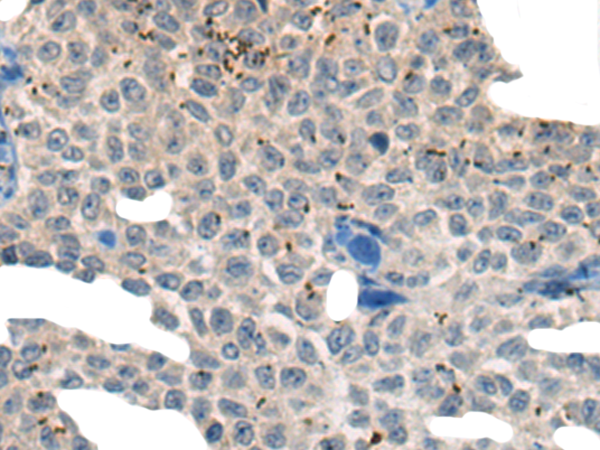
| WB | 咨询技术 | Human,Mouse,Rat |
| IF | 咨询技术 | Human,Mouse,Rat |
| IHC | 1/10-1/50 | Human,Mouse,Rat |
| ICC | 技术咨询 | Human,Mouse,Rat |
| FCM | 咨询技术 | Human,Mouse,Rat |
| Elisa | 1/5000-1/10000 | Human,Mouse,Rat |
| Aliases | MB21D1; h-cGAS; C6orf150 |
| Host/Isotype | Rabbit IgG |
| Antibody Type | Primary antibody |
| Storage | Store at 4°C short term. Aliquot and store at -20°C long term. Avoid freeze/thaw cycles. |
| Species Reactivity | Human |
| Immunogen | Synthetic peptide of human CGAS |
| Formulation | Purified antibody in PBS with 0.05% sodium azide and 50% glycerol. |
+ +
以下是关于cGAS抗体的3-4篇参考文献及其摘要概括:
1. **文献名称**:Cyclic GMP-AMP Synthase Is a Cytosolic DNA Sensor That Activates the Type I Interferon Pathway
**作者**:Sun L., Wu J., Du F., Chen X., Chen Z.J.
**摘要**:该研究首次发现cGAS(cyclic GMP-AMP synthase)是细胞质中识别病毒或异常DNA的关键传感器,通过催化产生第二信使cGAMP激活STING通路,诱导I型干扰素反应,为后续针对cGAS的抗体开发奠定理论基础。
2. **文献名称**:Antibody-Mediated Neutralization of Cytosolic DNA Sensor cGAS Ameliorates Autoimmunity
**作者**:Vincent J., Aarreberg L.D., Selinger C.M., et al.
**摘要**:研究团队开发了一种特异性单克隆抗体,可靶向抑制cGAS的酶活性和DNA结合能力,并在小鼠模型中验证其缓解自身免疫性疾病(如狼疮)的效果,证明cGAS抗体在治疗中的潜在应用。
3. **文献名称**:cGAS–STING Signaling in Cancer and Autoimmunity: Role of Therapeutic Antibodies
**作者**:Crow M.K., Olferiev M., Kirou K.A.
**摘要**:综述文章分析了cGAS-STING通路在癌症免疫和自身免疫疾病中的双重作用,提出通过抗体靶向调控cGAS活性以平衡抗肿瘤效应和过度炎症反应,并列举了相关抗体药物的研发进展。
4. **文献名称**:Structural Basis of cGAS Inhibition by Small Molecules and Antibodies
**作者**:Li X., Shu C., Yi G., et al.
**摘要**:通过冷冻电镜和晶体学技术解析cGAS与抑制性抗体结合的分子机制,揭示了抗体通过阻断cGAS与DNA或底物结合位点的相互作用实现功能抑制,为优化治疗性抗体设计提供结构学依据。
这些文献涵盖cGAS抗体的基础机制、治疗应用及结构研究,适用于免疫学、药物开发等领域参考。
**Background of cGAS Antibodies**
Cyclic GMP-AMP synthase (cGAS) is a cytosolic DNA sensor central to innate immunity. Discovered in 2013. cGAS detects aberrant double-stranded DNA (dsDNA) in the cytoplasm, such as viral DNA, bacterial DNA, or mislocalized self-DNA from nuclear or mitochondrial damage. Upon binding dsDNA, cGAS catalyzes the synthesis of cyclic GMP-AMP (cGAMP), a second messenger that activates the STING (stimulator of interferon genes) pathway. This triggers type I interferon and pro-inflammatory cytokine production, mounting an antiviral or antitumor immune response.
cGAS antibodies are vital tools for studying its expression, localization, and activation in physiological and pathological contexts. They enable detection via techniques like Western blot, immunofluorescence, and immunoprecipitation, aiding research into cGAS-mediated immune regulation. Dysregulated cGAS activity is implicated in autoimmune diseases (e.g., lupus, Aicardi-Goutières syndrome), chronic inflammation, and cancer. For instance, uncontrolled cGAS activation by self-DNA drives autoimmunity, while in cancer, cGAS can either promote antitumor immunity or support tumor progression depending on context.
Therapeutic targeting of cGAS is explored to modulate immune responses, with inhibitors and agonists in development. cGAS antibodies also help validate these strategies by assessing target engagement and downstream effects. Their role in elucidating DNA-sensing mechanisms and disease pathways underscores their significance in immunology and translational research.
×